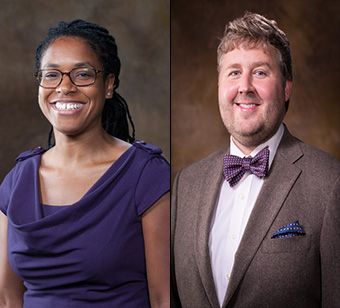FAYETTEVILLE, Ark. – Two education professors at the University of Arkansas College of Education and Health Professions have been awarded $70,000 fellowships by the National Academy of Education.
Conra Gist, an assistant professor of curriculum and instruction, and Michael Hevel, an assistant professor of higher education, received the National Academy of Education Spencer Postdoctoral Fellowship that supports scholars early in their careers and encourages them to undertake research relevant to the improvement of education.
“The fact that two of our young faculty received this award is incredible, since the National Academy of Education typically only awards fewer than 30 each year,” said Tom Smith, dean of the College of Education and Health Professions. “This is a highly prestigious award and brings very positive recognition to our college and the university.”
The funding allows the U of A faculty members to spend a year away from the classroom, working on research projects full time. Gist and Hevel both joined the College of Education and Health Professions faculty in 2012.
The U of A has had one other winner of the Spencer fellowship, a professor in the history department in 1999, according to the National Academy of Education website.
Gist’s research will help answer questions about how “grow your own” teacher-preparation programs create viable pipelines for teachers of color and potentially help them grapple with “double bind” experiences. Double binds are tensions between personal ties and systemic ties that foster hostile working conditions. “Grow your own” programs are designed to develop local, community-based teachers, but there is limited research explaining how teachers navigate these programs and whether teachers in them are more likely to stay in the profession.
Gist’s research examines black teachers specifically because they are leaving the profession at a higher rate than any other subgroup of teachers of color.
“If the experiences of black teachers are closely examined along a continuum in light of the challenges they may likely face as student-teachers, novice teachers and tenured teachers, their experiences can be instructive,” she said. “They can enable teacher educators and teacher education programs, school leadership and teacher development reformers to augment black teachers’ academic and professional growth through integrated systems of support.”
Gist plans to travel and conduct comparative case studies of black teachers in different models of “grow your own” programs across the United States. She is principal investigator of the “GYO Community Voices Project” and editor of the upcoming book, Portraits of Anti-Racist Alternative Teacher Preparation in the U.S.: Framing Teacher Development for Community, Justice, and Visionaries.
Hevel is writing the first comprehensive history of the lawsuits filed by LGBT student organizations to gain recognition on college campuses. He is focusing on the period from 1972 through 1997, during which nine lawsuits were filed that resulted in published judicial opinions. They were concentrated in the South but had national significance, Hevel said, as judges consistently ruled that refusal to recognize these groups violated the students’ First Amendment right to freedom of speech and association and their 14th Amendment right to due process. He believes the court decisions influenced other universities away from actions that could draw similar lawsuits.
Last year, Hevel was a semifinalist for the Spencer Postdoctoral Fellowship based on a book he is writing on the history of college students and alcohol that is under contract with the University of Chicago Press. This year’s funding will allow him to travel to access archival material and to conduct in-person interviews with people involved in the lawsuits.
Hevel recently interviewed an ACLU attorney who represented LGBT students in a case against the University of Arkansas in the 1980s. She said the cases were important because they represented some of the first successful lawsuits by LGBT Americans.
“This book will add to our historical understanding of college students’ activism in general, and gay college students’ activism, in particular,” Hevel said. “It will increase our understanding of the role of college students within the gay rights movement overall.”
About the University of Arkansas: The University of Arkansas provides an internationally competitive education for undergraduate and graduate students in more than 200 academic programs. The university contributes new knowledge, economic development, basic and applied research, and creative activity while also providing service to academic and professional disciplines. The Carnegie Foundation classifies the University of Arkansas among only 2 percent of universities in America that have the highest level of research activity. U.S. News & World Report ranks the University of Arkansas among its top American public research universities. Founded in 1871, the University of Arkansas comprises 10 colleges and schools and maintains a low student-to-faculty ratio that promotes personal attention and close mentoring.
Topics
Contacts
Conra Gist, assistant professor of curriculum and instruction
College of Education and Health Professions
479-575-3511,
Michael Hevel, assistant professor of higher education
College of Education and Health Professions
479-575-4924,
